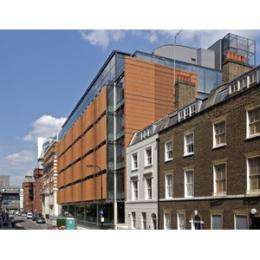Blood test provides 'snapshot' of tumor drug response

(Medical Xpress) -- Counting the number of tumour cells in blood samples taken before and after treatment for advanced neuroendocrine tumors could provide a ‘snapshot’ of how well patients are responding within weeks of starting treatment, according to results from a study being presented at the American Society for Clinical Oncology cancer conference today (Monday).
The study, coordinated by researchers from the Cancer Research UK and NIHR Experimental Cancer Medicine Centre (ECMC) at UCL Cancer Institute, is the largest of its kind and the first to demonstrate how monitoring cancer cells circulating in the blood can be used to predict treatment success for this rare cancer-type, which most commonly affects the gut or pancreas.
Patients found to have circulating tumor cells (CTCs) in the blood at the start of treatment were around eight times more likely to die from their disease, compared to those with undetectable CTC levels.
Study leader Dr. Tim Meyer, who directs UCL ECMC, said: “By using state-of-the-art technology to count individual tumor cells circulating in the blood stream, we’ve been able to show how a simple blood test could help monitor treatment response and predict how fast the disease will progress. Doctors normally rely on CT or MRI scans to tell them if a treatment is working, but cutting-edge CTC testing can provide an overall snapshot of the tumour’s development, without the need to wait for changes in its size to become visible on scans.
“Although these findings are preliminary, CTC testing is already showing promise in advanced breast, prostate and colorectal cancers and, on the basis of these results, is being incorporated into several trials involving patients with neuroendocrine cancers. This will help uncover ways of determining the impact of treatment on a cellular level, helping tailor treatment to individual patients."
The researchers analysed blood samples from 118 patients with advanced neuroendocrine cancers attending the Royal Free Hospital. They compared the numbers of individual tumour cells present in samples taken before and after treatment.
Patients whose CTC levels fell by more than two thirds within five weeks of starting a new treatment tended to have the best outcomes, while those whose CTC levels rose by more than a third did the worst.
Dr. Joanna Reynolds, Cancer Research UK’s director of centres, said: “This is a great example of how the Experimental Cancer Medicine’s Network is supporting cutting-edge research into rarer cancer types. Advanced cancers often consist of lots of smaller tumours around the body, many of which will be too tiny to be picked up by traditional imaging techniques, making it difficult to judge how well a drug is working. This study highlights a potential way to monitor response in real time across all cancer sites, so doctors know sooner if a treatment isn’t working. Although at an early stage, this is an exciting area of research and we look forward to seeing how it progresses.”
More information: abstract.asco.org/AbstView_114_96900.html














